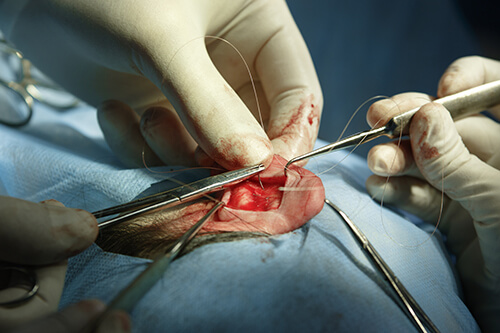There is one cosmetic surgery procedure in particular that can make people feel a bit more anxious than other procedures.
That procedure is otoplasty – also known as ear correction surgery.
Many people around the Birmingham region have considered this type of surgery, but are sometimes too anxious to pursue it properly.
This is because there are many question marks that hang over otoplasty in terms of what to expect and whether or not it actually works.
So, in this easy to digest article, we aim to bring clarity on what to expect and hopefully some peace of mind to all patients considering correcting their ears.

Otoplasty Basics
Otoplasty is the term used for ear correction surgery. This can include many solutions to ‘fixing’ ears that are deformed or that patients are unhappy with, such as size, shape and position.
One of the primary reasons why patients consider otoplasty is because their ears protrude. This can bring extreme levels of anxiety and make people feel self conscious and lack serious self confidence.
In addition, having ears that stick out can sometimes bring a lifetime of insults and sniggers from social circles such as school, work and socialising.
Furthermore, because the ears are such a prominent feature on the face, it can sometimes stop both men and women from wearing the clothes they want, or opting for a hairstyle they wish to have.
1. The First Step – Pre-Operation

- Whether you are ready to opt for ear correction surgery, or if you have doubts, arranging a consultation with a cosmetic surgeon is the first step to take.
- During a consultation, you will be able to discuss everything there is to know about the procedure and what to expect from it personally, including the results you wish to achieve. Sometimes you can send photos in advance via email in order for a surgeon’s opinion before arranging a consultation, although this depends on the clinic.
- During a consultation you will also be fully assessed medically to ensure you are the right candidate for otoplasty and that the results you want are actually achievable and realistic.
- In addition, it is during this step that it is also recommended that, should you go ahead with your surgery, you make suitable arrangements for pre-op preparation and recovery.
- Preparation for your surgery can include; avoiding alcohol, avoiding certain medicines such as aspirin, get a good night’s sleep the night before surgery and drink plenty of water for at least 3-4 days before your procedure.
2. The Second Step – Surgery

- The second step is actually attending the clinic for your cosmetic procedure.
- Otoplasty is commonly performed under local anaesthetic, so there is no need to be put to sleep and often no overnight stay in hospital.
- The procedure is tailored to your exact needs and will involve removing skin and cartilage, reshaping cartilage and pinned to the head using stitches to hold them in to a new position. Incisions are required during this procedure so there will be some scarring, although these are usually located behind the ears and hidden in the creases.
- Once the procedure is performed, your head will be bandaged tightly to cover and support the ears.
3. The Last Step – Recovery

- Depending on the extent of your surgery, you may be required to stay overnight in hospital, although returning home the same day is common.
- However, whether you are at home or in hospital, your head bandage will usually be changed the day after your procedure and another one will be applied.
- The bandage may also be changed again in around 3 days, and can be completely removed after one week in most cases.
- During this time, it is recommended that you do not wash your hair so that you provide the best possible chance for your ears to heal. Once the bandage is removed, a head band is worn for up to one month. Your surgeon will provide individual advice on how often to wear the head band – such as at night time only.
- During the recovery period, some patients report a loss of sensation in the ears, so it is advised to take caution in extreme cold weather conditions. Showering should be carried out carefully and swimming is not recommended to reduce the risk of infection.
- If you are active and currently play sports, you should expect to take a month to six weeks off from activity and take it easy. This is to ensure your ears fully set in to their new position without harm or damage from blows to the head.
We understand that otoplasty can bring a level of anxiety and feelings of anxiousness. That is why we are just a phone call away on 0800 007 5860 to answer any queries you may have relating to ear correction surgery. Call us for a friendly chat and no obligation consultation to make the first step to eliminating an issue that has potentially troubled you all of your life. To know more about ear correction surgery or otoplasty, please visit: https://dev.birminghambeautyclinic.co.uk/surgical-treatments/ear-surgery-birmingham/
Share This Post
Facebook
Twitter
LinkedIn
WhatsApp
Email
Pinterest




1 thought on “Top 3 Steps You Need To Know About Ear Correction Surgery or Otoplasty (2020)”
E-Taxi is an eco-friendly transportation service that offers electric vehicle rides for a sustainable travel experience. Combining convenience and environmental responsibility, E-Taxi provides a comfortable and reliable way to get around, while reducing carbon emissions. Professional drivers ensure a smooth and efficient journey, catering to both business and leisure travelers. With E-Taxi, you can enjoy modern, clean, and quiet rides, contributing to a greener future.